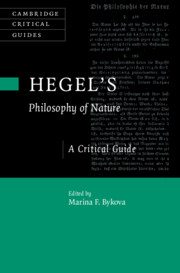Book contents
- Hegel’s Philosophy of Nature
- Cambridge Critical Guides
- Hegel’s Philosophy of Nature
- Copyright page
- Dedication
- Contents
- Contributors
- Acknowledgments
- Abbreviations
- Hegel’s Philosophy of Nature
- Part I Hegel’s Philosophy of Nature in the Historical and Systematic Context
- Part II Cosmology, Mechanics, and Physics
- Part III Organics
- Part IV On Contemporary Challenges for the Philosophy of Nature
- Chapter 13 The Prospects for an Idealist Natural Philosophy
- Chapter 14 Is There a Future for the Philosophy of Nature?
- Bibliography
- Index
- Cambridge Critical Guides
Chapter 14 - Is There a Future for the Philosophy of Nature?
from Part IV - On Contemporary Challenges for the Philosophy of Nature
Published online by Cambridge University Press: 19 December 2024
- Hegel’s Philosophy of Nature
- Cambridge Critical Guides
- Hegel’s Philosophy of Nature
- Copyright page
- Dedication
- Contents
- Contributors
- Acknowledgments
- Abbreviations
- Hegel’s Philosophy of Nature
- Part I Hegel’s Philosophy of Nature in the Historical and Systematic Context
- Part II Cosmology, Mechanics, and Physics
- Part III Organics
- Part IV On Contemporary Challenges for the Philosophy of Nature
- Chapter 13 The Prospects for an Idealist Natural Philosophy
- Chapter 14 Is There a Future for the Philosophy of Nature?
- Bibliography
- Index
- Cambridge Critical Guides
Summary
Hegel’s Philosophy of Nature is integrated into the fabric of his system. We absorb into our thinking the concepts and relationships that have survived the successes and failures of experience (Phenomenology). Through disciplined thought we articulate the internal logic of those concepts (Logic). By working out what the world beyond thought would be like, seeing how the world instantiates those expectations, and then building those discoveries into our next ventures, we develop a systematic picture of the stages of natural complexity and human functioning (Philosophies of Nature and Spirit). Since Hegel’s time, however, we have discovered that nature has a history; time and space are no longer absolutes; the discoveries of science have expanded in both breadth and detail; and our comprehensive explanations for the way the world functions are continually being falsified by the discovery of new facts. A philosophy of nature, then, needs to reshape the way reason functions. Adopting the strategies we use to solve problems and that science uses to develop and test hypotheses, we broaden our perspective to cover multiple domains in nature and search for patterns that show how and why they fit together as they do.
- Type
- Chapter
- Information
- Hegel's Philosophy of NatureA Critical Guide, pp. 273 - 292Publisher: Cambridge University PressPrint publication year: 2024

